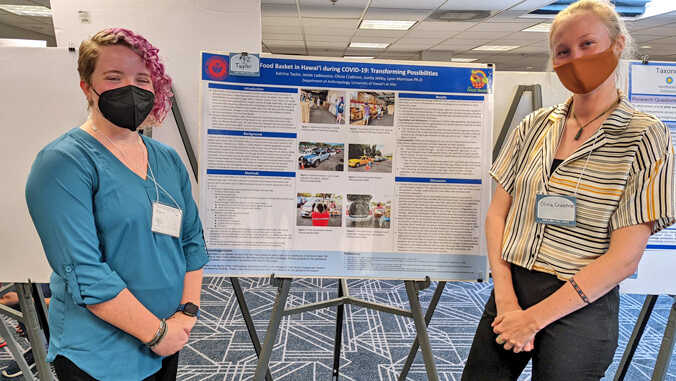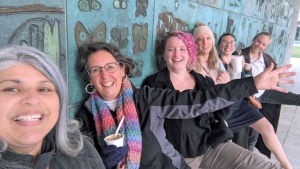
After a three-year hiatus from attending a conference in-person, five students from the University of Hawaiʻi at Hilo Department of Anthropology were thrilled to travel to Salt Lake City, Utah, to present their research at the Society for Applied Anthropology’s Annual Meeting in March. Their findings were based on data linked to social behaviors during the COVID-19 pandemic, everything from vaccine hesitancy to the Hawaiʻi Island community’s changing needs for food assistance.
Budding social scientists Amanda Sorenson, Sarai Garcia, Evangeline Lemieux, Katrina Taylor and Olivia Crabtree conducted research design and data collection and analysis for their group projects. The annual event gives students, researchers and practitioners from diverse disciplines and organizations the opportunity to discuss their work and consider how it can contribute to a better future

“After three years of virtual conferences, I was so happy to facilitate these five students going in person, feeling the excitement of being at a national conference, attending talks and career workshops,” said Lynn Morrison, a UH Hilo anthropology professor who mentored the students and co-authored the studies.
“It seemed whichever session I went to, there was one of our students engaging and asking questions. I was really proud of their enthusiasm and professionalism. They were great UH Hilo ambassadors,” added Morrison.
Presentations
Under Morrison’s guidance, Sorenson, Garcia and Lemieux collected quantitative data on COVID-19 vaccine hesitancy within the general public and among health care workers. The group’s goal was to understand why people refused the vaccine. An anonymous survey compared attitudes, beliefs and perspectives on the COVID-19 vaccine from individuals who were vaccinated and those who were not. They found the biggest impacts on people who opted against it were due to their sources of information, importance of group solidarity and associated demographic factors.
Taylor and Crabtree worked with Morrison to present their study on how a Hawaiʻi Island food bank program, The Food Basket, met the community’s changing needs during the pandemic. Students Jessie Ladouceur and Junita Jentley also contributed to this research but did not travel to the conference. The group conducted open-ended interviews with food bank staff and program recipients and gained insight through observation while assisting with food distribution. Findings show operational and organizational changes improved the program’s efficacy and will likely outlast the pandemic.
Sorenson and UH Hilo student Kailee Yoshimura also co-authored Morrison’s oral presentation on “Students of Hawaiʻi Transforming Possibilities: Learning and Living During COVID-19,” which documented challenges the Hawaiʻi Island campus’ students endured while trying to maintain mental and physical health.
Funding for the group’s trip to Utah was sponsored by UH Hilo campus program SHARP (Students of Hawaiʻi Advanced Research Program), Department of Anthropology and the College of Arts and Sciences Faculty Engagement Support Fund.
For more go to UH Hilo Stories.
—By Susan Enright

